The Real Secret to Making Money by Following Your Passion
You've probably heard the line about following your passion to the bank. Just do something you love and cash in...right?
As an astute reader of Get Rich Slowly, chances are you also know that there's more to it than that. Lots of people follow their passions and fail to make any money. Meanwhile, others are indeed able to craft a new life for themselves — and earn a lot of money — by pursuing something they love to do and finding a way to craft a business around it. What's the difference between these two groups? What separates those who fail from those who succeed?
Well, it's not about working less, manifesting riches, or waiting for wealth to arrive at your doorstep. It's about making something that improves the state of the world — or at least the lives of a small group of people willing to pay for it. It's about working more, but spending your time on the things you love to do.
<Book review: The $100 Startup
In March, I attended the SXSW Interactive Conference in Austin, Texas, and I had a chance to meet a few online personalities face-to-face, like former GRS staff writer Adam Baker. I also attended a session called The $100 Startup, a book reading led by Chris Guillebeau of The Art of Non-Conformity.
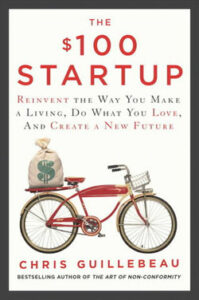 Long-time readers know that J.D. and Chris are good friends, which is why J.D.'s not reviewing this book. I, however, hadn't met Chris until attending his SXSW session. I'd like to think this would make me an unbiased book reviewer, but the truth is that the guy is just instantly likeable. His session that day felt much like it did to read his book: a personal conversation with a friend who sincerely wants to help you out.
Long-time readers know that J.D. and Chris are good friends, which is why J.D.'s not reviewing this book. I, however, hadn't met Chris until attending his SXSW session. I'd like to think this would make me an unbiased book reviewer, but the truth is that the guy is just instantly likeable. His session that day felt much like it did to read his book: a personal conversation with a friend who sincerely wants to help you out.
So there's my disclaimer — nicest guy ever. Luckily for me, his book is a must-read for anyone who's harboring a desire to start a small business ('cause how awful would it be to have to write a scathing review of a book by the nicest guy ever?). Continue reading...
The best books about money
In my mind, I write about personal finance books all the time. I certainly read them all the time, and I talk about them with the people I know. But the reality is that I haven't reviewed many books at Get Rich Slowly during the past couple of years. As a result, I've been getting a lot of e-mails asking for book recommendations.
Last weekend, I sat down to organize my office. As part of that, I performed a much-needed purge of my books about money. (And yes, I took them to a used book store so I could get a little bit of cash for them.) As I sorted, I made a list of my favorites, the books I recommend to people again and again. Today, I'm sharing that list.
It'll probably come as no surprise that most of these books were on the last list I shared (which was 2-1/2 years ago!). Many were on my first list of recommended reading back in 2007. But for this list, I've added a few titles and removed a couple of others. These are the financial books I think would be most useful to Get Rich Slowly readers.
Overcoming Uncertainty
I met an old friend for lunch the other day. Andrew and I have known each other since the first day of first grade — way back in 1975. "You know," he said as we slurped down Asian noodles, "when I first reconnected with you fifteen years ago, you were pretty much the same guy you were in high school. Even five years ago, you were still that same J.D. But now you're different — in a good way. It's like you've finally grown up. What happened?"
I didn't have a good answer at the time, but I do now. What happened? I stopped being afraid of life. I decided to take charge of my own destiny instead of waiting for it to arrive. I found ways to be confident in the face of fear. In short, I learned to thrive on uncertainty.
I haven't always been willing to take risks. In fact, for most of my life I've chosen the path of least resistance. I've done what seems safest. But you know what? For most of my life, I've been fundamentally unhappy.
Logic and Emotion: Why Smart Money Management Isn’t Just About Math
Eighteen months ago, I read Switch: How to Change Things When Change Is Hard by Chip and Dan Heath. This book changed my life.
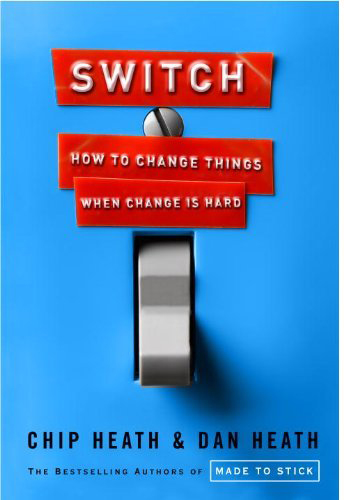 Switch explores the difference between the life changes we eagerly embrace and those we struggle with our entire lives. The book radically altered the way I plan, budget, eat, sleep, and work. Thanks to Switch, whenever I want to change any habit in my life, I now think of elephants.
Switch explores the difference between the life changes we eagerly embrace and those we struggle with our entire lives. The book radically altered the way I plan, budget, eat, sleep, and work. Thanks to Switch, whenever I want to change any habit in my life, I now think of elephants.
Let me explain.
Book review: Early Retirement Extreme
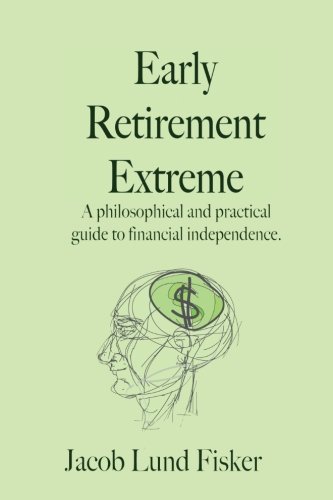
No surprise then that over the last couple of months I've been obsessed with Jacob Lund Fisker's Early Retirement Extreme blog. And no surprise that my first book review since September is of Fisker's book, also called Early Retirement Extreme.
Early Retirement Extreme
Imagine a personal finance book written by a theoretical physicist. What would it be like? Full of formulas and figures, right? Well, that's what you get with Early Retirement Extreme. But you get more, too.
Living below your means is like saving for retirement twice
Hello, GRSers. Today, let's revisit something I tacked on to the end of my nine lessons from The Millionaire Next Door:
[T]here are actually two benefits of learning to live on much less than your paycheck.
- The first, of course, is that you can save more.
- But secondly, it also means that you ultimately need to save less.
Permit me to demonstrate.
An interview with Thomas Stanley, co-author of “The Millionaire Next Door”
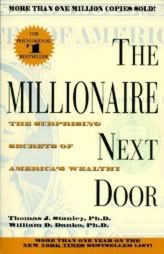 A while back, I mentioned the book The Millionaire Next Door to one of my colleagues at The Motley Fool. "That book changed my life,” she gushed. For some people, it really can be that powerful — even fifteen years after it was first published.
A while back, I mentioned the book The Millionaire Next Door to one of my colleagues at The Motley Fool. "That book changed my life,” she gushed. For some people, it really can be that powerful — even fifteen years after it was first published.
In this post, I present an edited transcript of a conversation I had with Dr. Thomas Stanley, co-author of The Millionaire Next Door and author of several other books, including Stop Acting Rich, published in 2009.
Robert Brokamp: In a few sentences, who is the “millionaire next door”?
<
Nine lessons in wealth-building from The Millionaire Next Door

Want to become a millionaire? Then perhaps you should start by studying the behaviors of people who have done it. Check out the lists of the best financial books of all time, and you're bound to find several that include The Millionaire Next Door: Surprising Secrets of America's Wealthy.
 Written in 1996 by marketing professors William Danko and Thomas Stanley, its main premise is that people who look rich may not actually be rich; they overspend — often on symbols of wealth — but actually have modest portfolios and, sometimes, big debts. On the other hand, actual millionaires tend to live in middle-income neighborhoods, drive economical cars, wear simple watches, and buy suits off the rack.
Written in 1996 by marketing professors William Danko and Thomas Stanley, its main premise is that people who look rich may not actually be rich; they overspend — often on symbols of wealth — but actually have modest portfolios and, sometimes, big debts. On the other hand, actual millionaires tend to live in middle-income neighborhoods, drive economical cars, wear simple watches, and buy suits off the rack.
You've likely heard of the book. You may be familiar with the premise. Perhaps you even read it way back when. But if you read it again — as I recently have — you'll be reminded of some of true gems of wisdom Danko and Stanley gleaned from their thousands of surveys of millionaires.
The tiger mother and you: Are we preparing our kids for a better financial future?
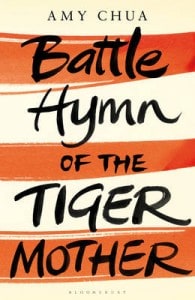
A lot of people wonder how Chinese parents raise such stereotypically successful kids. They wonder what these parents do to produce so many math whizzes and music prodigies, what it's like inside the family, and whether they could do it too. Well, I can tell them, because I've done it. Here are some things my daughters, Sophia and Louisa, were never allowed to do:
- attend a sleepover
- have a playdate
- be in a school play
- complain about not being in a school play
- watch TV or play computer games
- choose their own extracurricular activities
- get any grade less than an A
- not be the No. 1 student in every subject except gym and drama
- play any instrument other than the piano or violin
- not play the piano or violin.
As shown in this Today Show interview with Chua — a Yale law professors and the daughter of Chinese immigrants — when her daughter gave her a plain handmade birthday card, Chua handed it back and said, "I reject this."